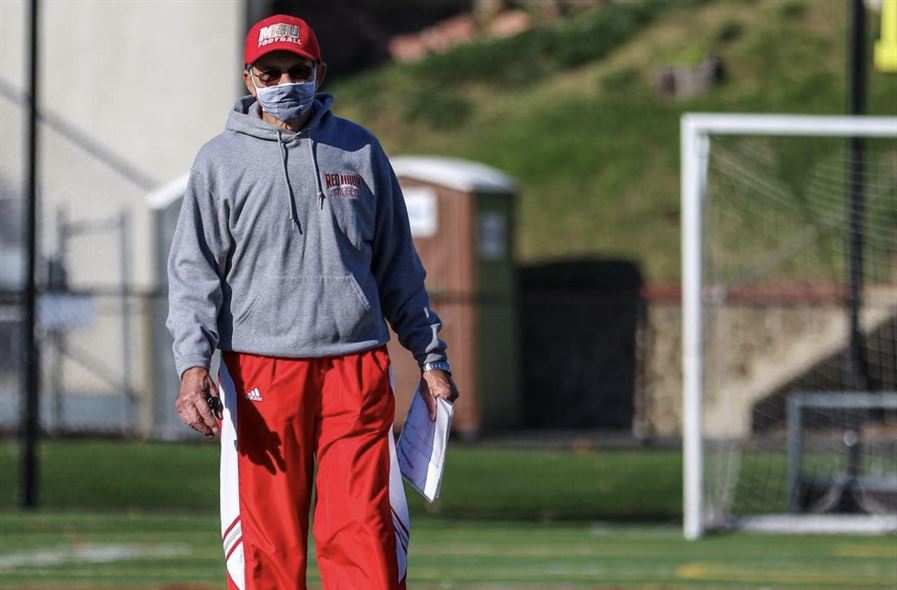#FocusDisruption is a collaboration of all the media outlets within Montclair State’s School of Communication and Media. Our goal is to report stories that highlight the effects or disruption of the last two years and the solutions that have come out of it. All aspects of day-to-day life have been altered but we will be primarily focusing on how mental health, education and the workplace have changed.
Today, as the United States has reached its 27th month since the first coronavirus (COVID-19) case was found in the country, not all normal activities before the pandemic are returning to their former glory.
But sports have, for the most part, turned back to their normal time slots, their normal amount of games and fans can cheer on their teams with much less worry about the virus.
This is especially true within the New Jersey Athletic Conference (NJAC) and Montclair State University. The baseball team is surely on pace for a conference championship, and the lacrosse teams are picking up steam when it matters most heading into the playoffs. But back in early 2020, sports moved to the back of everyone’s mind, even for the players, coaches and staff.
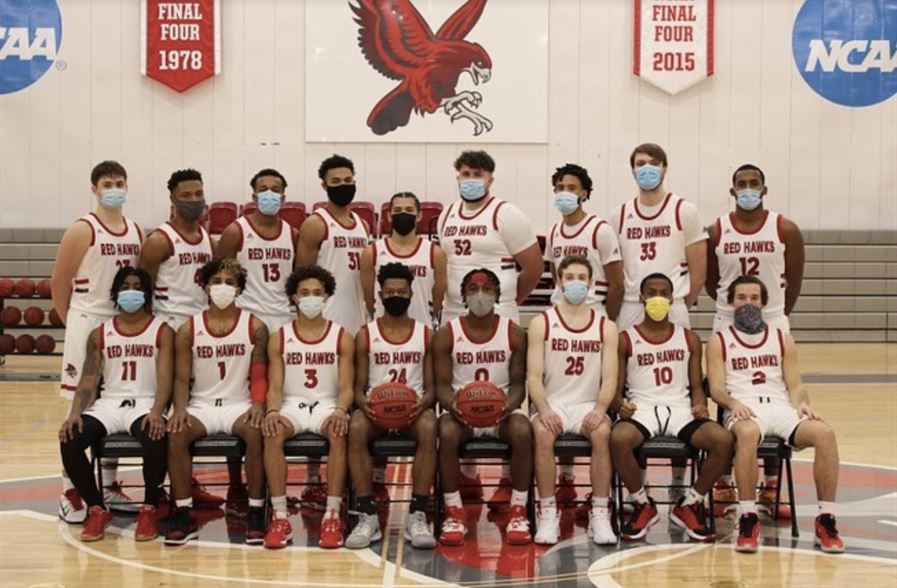
The 2021 Montclair State men’s basketball team, all masked up for a team photo.
Photo courtesy of Montclair State Athletics
Terry Small, the commissioner of the NJAC, remembers leaving an NCAA convention and receiving word as the plane landed that star Utah Jazz center Rudy Gobert contracted the virus, and the NBA immediately suspended their season. But Small and the conference had different ideas compared to NBA commissioner Adam Silver at first.
“We had hopes at the time that we would come back and finish our spring seasons,” Small said. “That obviously didn’t happen but there was so much we didn’t know about the virus, we didn’t know if we were on a two-week pause or a semester-long pause.”
March 18, 2020 was the day that would change collegiate sports in New Jersey forever. The NJAC decided to cancel all sports and championships for the 2019-2020 academic year. Even with such a monumental decision, Small said the choice wasn’t too difficult as no students were returning to campus for the rest of the semester.
After the decision was made, Small said all of the energy was then put toward preparing for the next academic year. With the conference consisting of schools like Rowan University, The College of New Jersey and Kean University, the conference commissioner said Montclair State played a big role in getting student-athletes back to playing.
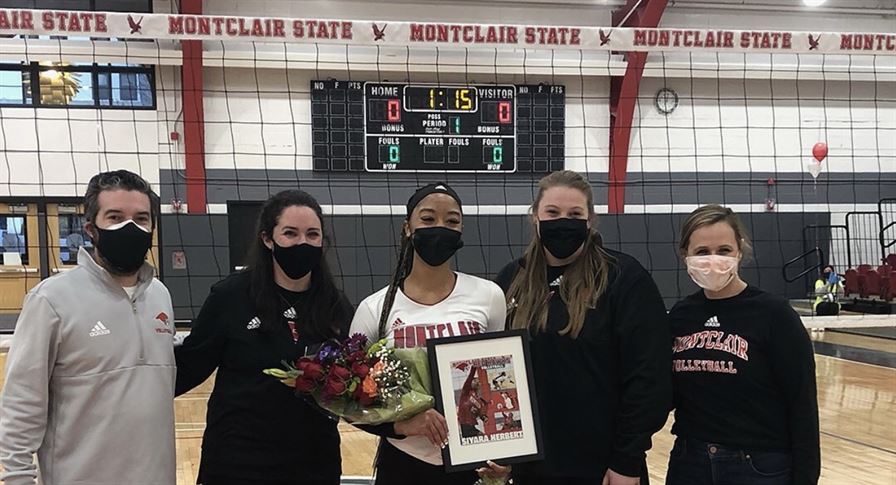
Former Montclair State volleyball player Siyara Herbert celebrates her senior year with the coaching staff.
Photo courtesy of Montclair State Athletics
“[Former] president Susan Cole was a chair in our presidents’ council, and Rob Chesney, the intercollegiate athletic director, was the president of the NJAC Board of Athletic Administrators, so in essence, he was the president of the conference,” Small said. “Working with [Chesney] and [Cole], we put our heads together and tried to come up with a way to return to play in a safe and consistent manner.”
From that March up until July, when the decision was inevitably made to suspend all sports and competition for the fall 2020 semester, and in a time when no sports were going on, the NJAC was as busy as ever.
Members were having meetings weekly and sometimes even multiple times a week, figuring out potential next steps and what other schools were doing at the time.
To add even more difficulty to bringing sports back for NJAC schools, some schools in Division III individually already chose to hold out of the fall 2020 semester — including one close to home.
“We actually had competition planned that fall but the dominoes started to fall,” Small said. “We found out The College of New Jersey was the third institution in Division III to make the announcement, I believe as early as late June, that they were not going to have competition in the fall semester.”
With the odds stacked against them once again, July 28, 2020 was the day that sports were suspended once again within the NJAC. The football fields were empty. The basketball courts were silent without the squeak of sneakers. For the second time for Small and the conference, it was back to the drawing board as to how to officially bring sports back.
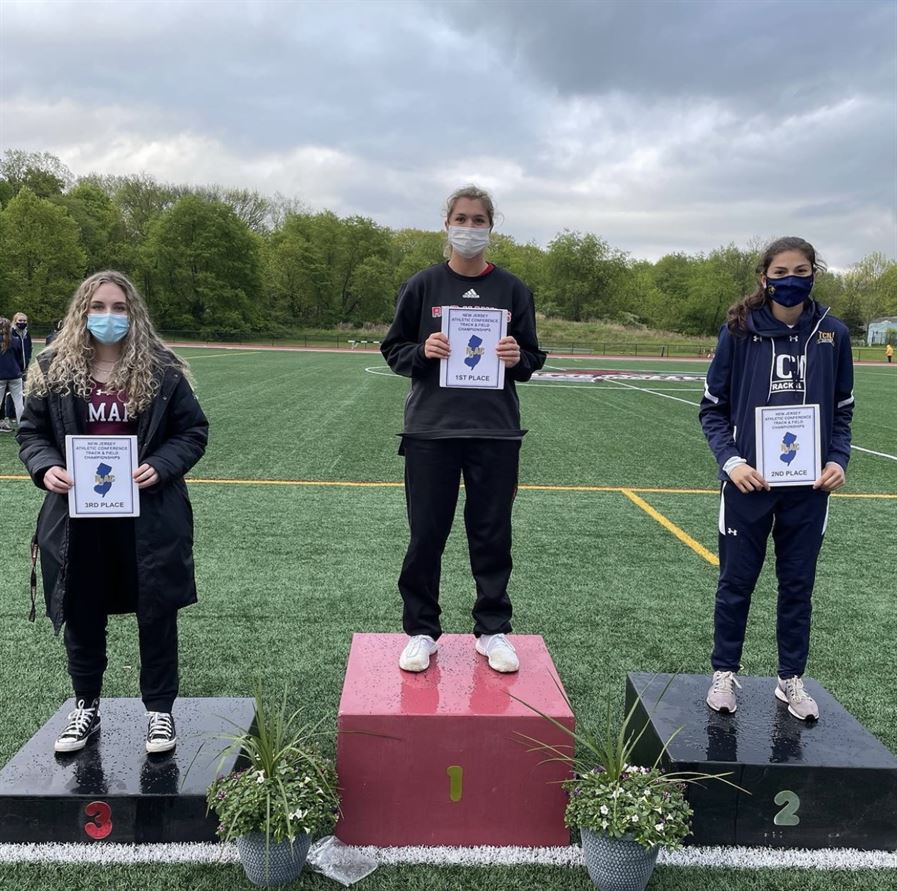
Christine Griffith up on the podium for winning first place at javelin at the 2021 NJAC Outdoor Championships.
Photo courtesy of Montclair State Athletics
The focus within Division III sports has always been higher education so the conference did not want to take the student out of the student-athlete. But ideas were floated around such as a one-week tournament for soccer, which would constitute a similar environment, but it never came to fruition.
Towards the end of 2020, New Jersey Gov. Phil Murphy made a major decision to bring back indoor sports with strict restrictions.
Once that choice was made, the NJAC slowly rolled out plans for basketball, football, soccer, volleyball and field hockey to return for a shortened season. Small could not have done something so spectacular without a lot of outside help.
“This is one area that I give a lot of credit to our athletic trainers, our presidents and our administrators,” Small said. “It was not easy. Take football for example from an athletic training standpoint, you have a finite number of resources. So in a lot of ways, you are trying to figure out how to cover football and baseball and basketball and soccer and tennis at one time.”
There were successes with this in-conference model for all sports when it came specifically to Montclair State, like when the football team secured the NJAC North title against William Patterson University.
But there was also the negative side, with the men’s basketball team having their season cut short with the NJAC semifinals right in front of them due to a positive COVID-19 case.
Overall, a crazy idea worked out for the conference. During 2021, the virus spiked up and down like a rollercoaster but luckily spectators were slowly being allowed to watch games. It started with friends and family of the athletes, and eventually, outside fans thanks to the introduction of the COVID-19 vaccine.
“It was awesome [to see fans back in the stands],” Small said. “You take our parents; they have a limited amount of time to see their son or daughter play and you have to treasure those opportunities. It was a way to get those people back at the field compared to watching on a computer screen.”
One student-athlete parent is Montclair State’s athletic director Rob Chesney. With no sports going on for the Red Hawks back in 2020, Chesney and his staff had to work hard to give the student-athletes a worthwhile experience.
“That was really important for us,” Chesney said. “We worked closely with the [NJAC] and [Small], our staff here, and our upper administration here at the university did a great job. We put our minds together and came up with the best we could and we allowed the student-athletes to participate.”
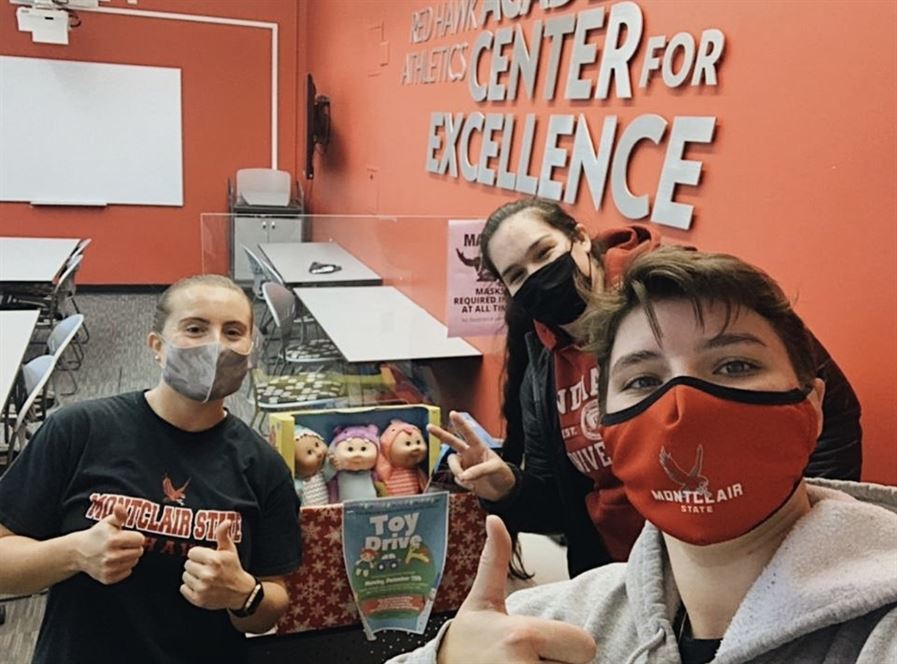
Even with sports cut short for almost a whole year, the student-athletes kept themselves busy, like the softball team donating to a toy drive.
Photo courtesy of Montclair State Athletics
Just like every semester, even with an unusual pause from the norm, the message was always clear to the student-athletes: keep on top of your education. This held true at Montclair State, with plenty of athletes receiving high academic marks.
“I think that [having no] sports was a great break for them because all they were doing was staying at home and doing Zoom classes,” Chesney said. “So I would like to think this really helped them and that we had great success academically during that period.”
From the time with no sports, then to the craziness of all Red Hawk athletics going on at once in spring 2021 and now to the present day, Chesney has learned a lot about his staff, the athletes and his mission as athletic director.
“Our student-athletes are a pretty hardy group, so there are times where things are not going to go as they’re planned,” Chesney said. “But people can manage and deal with it, and the most important thing is we did the best we could to provide a quality student-athlete experience.”
The question remains; will sports ever return to a pre-coronavirus normal? Chesney believes we are already heading in that direction. Small is not as sure but is confident people will remain cognizant of issues raised during the pandemic.
Regardless, sports within the NJAC are trending in the right direction when it comes to dealing with the pandemic, and while nothing can be set in stone, the conference along with Montclair State athletics has a bright future ahead.

